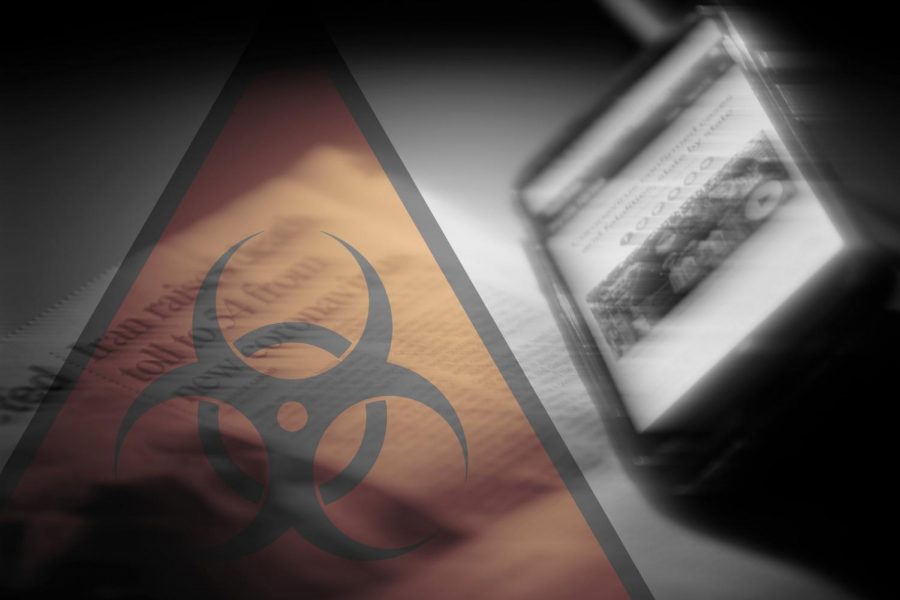Opinion: Beware the disinformation virus
March 6, 2020
Advice abounds for how to properly prepare for a potential corona virus outbreak.
Wash your hands, buy extra food and supplies, avoid sick people, don’t touch your face, and yes, wash your hands again.
But allow me to offer my humble piece of advice: pick the media you consume carefully. That’s because while everyone knows that a viral outbreak is dangerous, we aren’t quite so guarded when it comes to the viral spread of bad information.
Call it what you will, fake news, false news, propaganda, hoaxes — but disinformation, intentional or not, is a real danger to our society.
We know that bad information is out there. We know for a fact that foreign governments use fabricated news stories to sow discontent and panic in our society. (I’m looking at you Putin.) But that isn’t the end of the fake news you need to be guarding against.
What you might not be aware of is that there are outright fabrications that are made as clickbait. There are entire websites that simply make up their stories and pass them off as real news. They do that because when you click on that surprising-yet-almost-believable headline, that website banks a tiny fraction of a penny in ad revenues.
If enough of us click on those, they make enough money to make their lies profitable.
Some of those sites are well known and harmless parodies – such as The Onion or the Borowitz Report or the Babylon Bee. But others aren’t quite so obvious. Before moving forward, make sure the outlet you are quoting intended the news to be real.
Disinformation doesn’t just end there. There are some news outlets that trade in one-sided news and refuse to give equal play to the other side out of a profit motive. They know that people will flock to their echo chamber because hearing what makes them agree makes them feel good.
Making their audience feel good means the audience comes back for more, rewarding that news outlet financially for their bias, and perpetuating the cycle.
Fight the urge to only consume news meant for one party or another.
Still other news outlets put out bad information because of the sad state of the media. Many newsrooms are stretched to the breaking point financially. They are trying to cover the world on a shoestring budget, and they occasionally get in trouble because they put out information that was not meant to be inaccurate, but still missed the mark because of overwork, a rush to publish before verifying, or just because they made a bad assumption.
The key, especially with the stakes as high as they are on the eve of a potential epidemic, is to be sure you know who the news outlet is that you are consuming. Make sure you look at that URL and read the “about me” section of the website. Have you heard of them? Do a quick web search for them. Check resources like Snopes and Politifact to see if the claim or the news outlet has been identified as problematic.
Remember that a news outlet with a national reputation should hold more weight than one whose audience is limited to a small town in a faraway state.
In general, look for outlets with strong reputations. While that won’t always keep you out of trouble, it is a good place to start. Fox News, CNN, and MSNBC all tend toward political bias, but their real reporting tends to be sound. The trouble is, their reporting tends to be mixed indiscriminately in with their opinions and their pundits’ specuation.
Spotting the difference between news and opinion isn’t always easy. Reputable outlets label their content as opinion, but others don’t bother to take that step.
A good tell is to look for reporting that cites good, real, named, reputable sources. And it doesn’t hurt to do a quick search on those sources to make sure they exist.
If an outlet is citing an unnamed or anonymous source, then they are essentially saying “trust me.” Before buying their reporting, ask yourself first, “do I trust them?” If not, then hold out for more reporting before sharing.
Double check surprising headlines with multiple sources – sure, scoops happen, but not for long in today’s news environment. If someone has something first, chances are their competitors will be racing to verify that claim and will be reporting the same thing shortly.
Be wary of claims that don’t turn up in multiple places.
And on that same note, don’t trust something just because another outlet has cited that first source. You have seen this before “So and So is reporting that…” Consider that just a single outlet, and keep your grains of salt handy until other outlets have verified those facts.
And for the love of all things holy, don’t just trust something because it has good play on social media. Social media is a fast way to disseminate information – fake and real. Just because someone tweeted it or posted about it should not be the same in your mind as a professional reporter verifying it.
It’s sad that many news outlets have descended into partisan drivel and a screen full of talking heads yelling at each other, but that’s the sad reality of a lot of what people consider news. It’s sad that many reputable news outlets are being gutted for financial reasons, and resources aren’t being poured into real reporting like they were even a decade ago.
It’s sad because what it means is that those partisan and resource-strapped outlets have shifted the burden of fact checking in large part onto their audiences. That means you.
Remember, good reporting is hard work. Good reporting takes time. Sure, even good reporters make errors, but those good reporters fess up to those errors and correct them. If the outlet you are choosing does not do that hard work, it’s up to you to keep that skeptical eye and verify those facts.
Now, more than ever, when you see that surprising headline, go through your mental checklist. Sure, it may be some surprising breaking news story. But just as likely, it could be someone trying to deceive you. Do your best to be a responsible news consumer and fight to find the truth.
Oh, and wash your hands.








